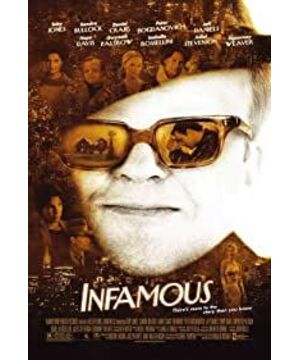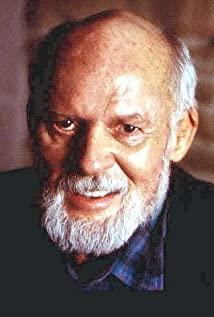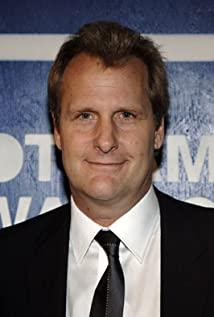When a good idea comes up, Hollywood studios often swarm it, often with two movies showing the same theme at the same time. For example, "AntZ" and "A bug's Life" in 1998, "The Prestige" and "The Illusionist" in 2006, "Avatar" and "Future Men" in 2009 The Surrogate, 2013's Hitchcock and The Girl, and more.
Today I want to talk about two Truman Capote autobiographical films from 2005, Capote and Infamous. Although the former won the Oscars, in fact, the latter completely outperformed the former in terms of performance, script, emotional depth and viewing value.
Truman Capote is a well-known American writer. He also has a high status in Hollywood, and once had a good relationship with celebrities such as Marlon Brando and Marilyn Monroe. But he came from a humble background, and his mother's only dream was to be a rich wife in the upper class of New York. To realize this dream, Truman's mother abandoned him and remarried a New Yorker. And when his mother found out that her new husband had illegally possessed a lot of money in order to realize her dream and could not realize her dream of entering the upper class, she committed suicide in despair. The irony is that when Truman Capote grew up, he broke into New York's upper class with his literary talent, and after breaking into the upper class of New York in one fell swoop, he almost cut off contact with all his former friends, except for "To Kill a Mockingbird" author Harper Lee. , since she not only knew Truman as a child, only Harper Lee knew all of Truman's deepest pains. Why are these two childhood friends so talented in literature? I think it's because Harper Lee's father was a lawyer, so they used to sit in on trials when they were two kids. "Other kids like to watch movies, we like to sit in on trials," they say. During the trial, we were able to learn a lot about human nature, which laid a solid foundation for their future writing.
To survive in high society, Truman learned to disguise himself. Although he has a very weird voice and openly admits to being gay, the hypocrisy required by the upper classes goes far beyond just hiding one's sexuality. While Truman wears ostentatious women's clothing every time he goes to places no one knows him, when he dines with his high-society friends, he wears a suit. He told everyone around him that they were his best friends, and he was going to pretend that he didn't have a humble past, that he was born a member of the upper class, and that he liked the ladies who had nothing to do all day. Truman spends a lot of time and energy being the women's friend of the upper-class ladies, listening to their complaints, giving them psychological counseling, and spreading slander. Knowing that if they can get on well with them, their powerful husbands will help him when needed. The so-called "better than knowing the president of the United States is knowing the first lady."
Truman lived a long life in such a hypocritical upper-class life. Until one time he interviewed a gay murderer for his book "In Cold Blood". The murderer was not as violent as he thought. On the contrary, he was very interested in art and kept asking Truman to tell him the story of Marlon Brando. At first Truman approached him just to get the murderer to open up to him so that Truman could write the book he wanted to write. But when they got to know each other, Truman felt that they had a lot of similarities. For example, the murderer was also abandoned by his parents when he was a child. They both have an artist's soul and a sympathy. The only difference between them is that Truman is more talented and luckier than him to live in a society that accepts homosexuality. In the end, Truman discovered that the prisoner had killed because he wanted to prove to his mates that he had the guts and wasn't gay.
Gradually, in the process of interviewing the prisoner, Truman began to feel that they understood each other, so he couldn't help falling in love with him. But sadly, Truman didn't treat his feelings with sincerity, but kept lying to himself that everything he did was in order to write this crime-documentary book. So after his interview, Truman returned to the upper classes in New York, back to his boyfriend, but he never forgot the murderer.
In fact, Truman's social circle is very wide. If he wants to help this prisoner get rid of the death penalty, it is entirely possible. But he always chooses to put himself in a neutral point of view, a professional point of view, and an artistic point of view. Even more terrifying is that because the theme of the book "In Cold Blood" he wanted to write was not only these prisoners who killed innocent people in cold blood, but now the government is also killing these prisoners in cold blood. If the murderer is not executed, the theme of Truman's book does not stand. So not only was he not helping his lover, but he was anxiously waiting for his lover to be executed so that his book could be published. So what Truman never expected was that the coldest person in this story was not the murderer or the government, but himself.
On the day the murderer was executed, Truman went to say goodbye to him "in order to write his book." But after the murderer was executed, he seemed to feel like he was being executed with his lover, and found himself making the biggest mistake of his life: Although he could face his own homosexuality, he But he can't face his true feelings. In the name of art, he betrayed himself, the people he loved, his past, and his true friends. So when he realized this, he would never be able to return to the rich circle of the past.
Later, in order to distance himself from these upper-class people, he published a book called "The Answered Prayer", in which he wrote about all the scandals of the upper class that he knew. For Truman, it was his social suicide. Then for the rest of his life, Truman never wrote any novels. In the end, he knew that his heart was uncomfortable, but he did not let his friends send him to the hospital, and completed the final physical suicide.
Truman's tragedy taught us how important and difficult it is to be honest with ourselves. To be sincere to yourself must be sacrificed, but if you cannot be sincere to yourself, the price you will pay in the end is much greater. Truman betrayed himself because he was reluctant to give up the upper-class life in New York he finally broke into. He is reluctant to this hypocritical social circle not only because of his own vanity and greed, but more importantly because of the subconsciousness that his mother buried in him: the upper class is better than anything else, and it is better not to live if you can't live in the upper class. Another reason may be that only the upper classes can have such a gay-tolerant lifestyle. So although he had fallen in love with the prisoner, he dared not admit it to himself. It stands to reason that as a writer, he should know his heart very well. But he lived in the upper class for too long, too far from his real life, and it was too late to realize his problem until he watched his lover be executed. In the end, the prisoner left everything he had to Truman, but Truman failed to treat his lover sincerely, the only thing he could give was the hypocrisy he paid to write his book.
Truman's tragedy taught us that there is nothing more costly than the betrayal of one's own soul. Sometimes we have to use superficial hypocrisy to win real sincerity. For example, although Truman can flaunt his homosexuality everywhere, he has only achieved superficial honesty, but sacrificed the soul that is really important; instead of this, he might as well hide his sexuality and bravely save his own life. spouse.
To save the people you love, to save the values you believe in, is to save yourself. If we are too selfish and just think about ourselves, we are betraying ourselves because our life is meaningless without those we love and those who love us. As the saying goes, if we lose our soul, even if we have the whole world, what's the use? This sentence couldn't be more accurate on Truman.
"Ignorance" also shows that depression is completely caused by the numbness and selfishness of this society. The protagonist suffers from depression because his father abandoned the family since he was a child, which made his mother become schizophrenic. The protagonist's brother is doing well in the United States, but he will never come, regardless of the life or death of his family. The protagonist's neighbor, a single mother, also obviously suffers from depression, because she has no one else in her heart and only thinks about herself. The protagonist's girlfriend is in pain because she cares too much about her own pain and doesn't think about the difficulties of others. In the end, she believed in God, but in fact she just wanted God to share some pain for herself. Only the protagonist is willing to take care of his schizophrenic mother, but he fails to take care of his girlfriend's feelings. In fact, it made no difference whether his mother took care of him or not. If he insisted on it, not only could he not bring happiness to his mother, but he also ruined both of them. Therefore, we must be wise enough to know when to persevere and when to give up, and try to focus our energy on what really deserves our attention. If doctors can care more about patients, if neighbors can really care about each other a little more, and family members can communicate more with each other, the real benefit is not others, but ourselves.
We as a human being do not have the courage to give up our immediate interests and fight for the right thing. In fact, we are the ones who betray ourselves in the end. For economic benefit, we continue to brutally slaughter animals, discharge sewage and waste gas continuously, and become the biggest devil on this earth. In the end, each of us will pay dearly for it. If each of us can save a pig, in the end we may save ourselves.
SearchWithin
Just connect the line,
The answer is there.
The answer is right there,
if we bother to connect the dots.
View more about Infamous reviews











